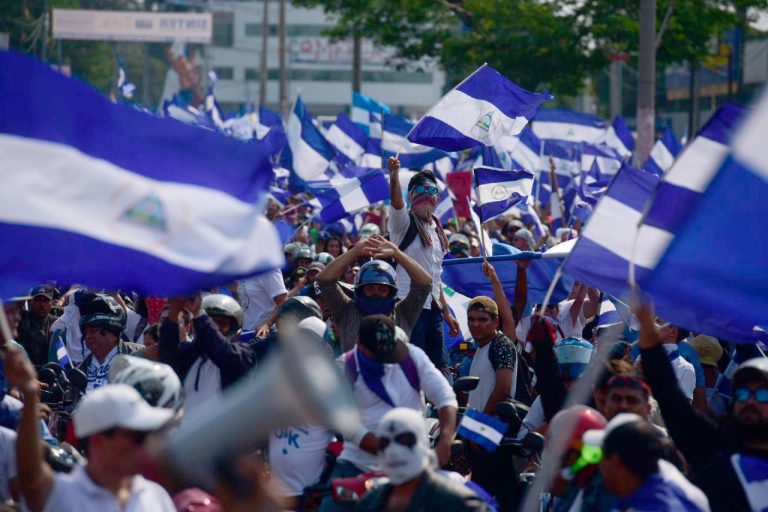2 de julio 2019

Children of Exile: The Births “Sowing Hope” in the Camp of Nicaraguan Farmers

PUBLICIDAD 1M
PUBLICIDAD 4D
PUBLICIDAD 5D
We’re at a stage where the country’s most useful politician isn’t the one that talks the loudest but the one who gets the most done through.

The citizens’ awakening that began in Nicaragua in April 2018 generated an expectation for change in the way we do politics. The phenomenon of the self-organized, and the use of technology and social media to share opinions and coordinate, together with the recuperation of public spaces, was a breath of fresh air to the depressed political lives of all Nicaraguans.
The road to change can be summarized by the slogan of the non-violent struggle: Patria libre para vivir [“a free country to live in”]. This provides an answer to the question that we’re all pondering, and that to our great frustration we’re unable to answer. How can we get out of this dictatorship?
When the self-organized stage ended, we went on to attempt the construction of new forms of political organization. These forms were marked by terms like horizontal, feminist, plural, inclusive, multigenerational, participative, civic and peaceful. Unfortunately, while we made a great leap in terms of conceiving our spaces, we’ve fallen short on methods to construct them.
Distrust, the delirium of conspiracy, prejudices, intrigue, past resentments, sectarianism, attacks on people and not on ideas, accommodation, management, double-speak, classism, machismo, homophobia, not speaking directly, waiting for party lines, all these, among others, have characterized the “new” political organizations.
Very definitely, we’ve wanted to build a foundation of new ideas without abandoning old practices.
In a little over a year, we’ve lost the rebellious and transformative essence of the April movement insofar as the organizational structure is concerned. What we dreamed in our heads we haven’t managed to make concrete with our actions. We’re full of specialist opinions, but we don’t have any secretaries. We have agitators, but we don’t have organizers; we have adults who analyze and don’t act, and young activists with no proposals.
“We must occupy the spaces,” the organizations repeat, but once they’re they don’t construct them with their work, or worse yet, with their ideas. The spaces have become the end and not the means. This is serious, especially when those spaces haven’t been able to construct either the conceptual or organizational bases to remake the state and society. They’re a bubble that’s ever more distant from the bases and the ideals of that April.
The April movement requires new narratives that can give body and roots to the change. The charismatic leaderships are apparently not enough to make the leap from intentions to actions. Maybe we’re presently at a stage where the most useful politician for the country isn’t the one who talks the loudest but the one whose example and work gets the most done by developing proposals and how to bring them into practice.
Maybe at this stage we need a combination of political figures, some who inspire and others who can be more concrete and reconcile different positions. Society will have to learn to value political qualities that aren’t so popular, but that are necessary in a phase of construction like the one we’re living through.
We need leaders that speak directly, that do the hands-on work, that are not only good at the podium but also at performing the tasks; who provide depth of thought and eloquence, who are accountable, who communicate, who are respectful, tolerant, open minded, who know how to listen and accept criticism.
The new organizational forms must overcome the vices of the past, such as dependence and economic comfort (as in a salaried militancy). They will need to be radical but sensitive, dreamers but hard workers, firm but with a sense of humor. Self-starters, collaborative networking, support for art and technology, transparency, respect for diversity and a real and direct closeness with the social bases should be the intrinsic qualities of the new political organizations.
We of the millennial generation have the great challenge of reconfiguring and finding new meaning for political action in Nicaragua. We have to give people back their hope that changes can be made for the common good through political action, and that the politicians can also be honest and hard-working people. We also must keep in mind that collective actions are worthwhile, and that the public is made up of all of us.
In that sense, we’ve already taken a step forward by accepting and assuming the responsibility of organizing ourselves to impact or to take over political power. We must also have the wisdom to humbly recognize the methods and lessons learned from the past, without ever giving up the new tools and concepts of our era.
The new form of conducting politics, like the new political organizations, should be an amalgam of the best of our past with the best of our present. We must construct the new Nicaragua with the work of all; it’s a job that must be built on day by day, with ideas, and above all, with examples. If we don’t want more of the same, we must begin from within.
Thank you for reading our English section, brought to you in collaboration with Havana Times. If you wish to subscribe to our English Weekly Newsletter, you can do it here. Please spread the word and share this link with your friends, family or contacts.
Regards,
Archivado como:
PUBLICIDAD 3M
PUBLICIDAD 3D